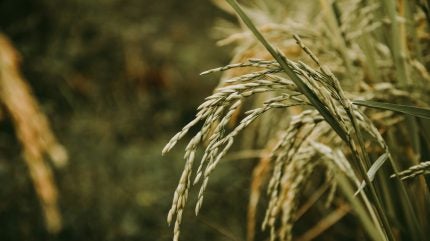
The global production of core agricultural commodities, including rice, maize, sorghum and oilseeds, are expected to reach “record levels”, according to research from the FAO.
The UN agency’s latest assessments indicate a relatively optimistic outlook for global food commodity markets, with production anticipated to increase across all commodities, except sugar.
Global wheat production is forecast to increase “modestly” in the coming year while per capita food consumption declines, according to the biannual publication.

Discover B2B Marketing That Performs
Combine business intelligence and editorial excellence to reach engaged professionals across 36 leading media platforms.
Output gains are anticipated to be driven by a 13% increase in the EU “owing to a weather-driven upturn in yields, as well as a potential all-time record harvest in India driven by increased planting areas”, the FAO said.
Coarse grain production is expected to increase by 3.4% to a “record level”, buoyed by “solid prospects” in Brazil, the EU and especially the US, which is forecast to boost maize output by 6% mostly due to an expansion in sowings.
More favourable weather ought to “lift” maize production in southern Africa as well, the report said.
FAO also released its first forecast for world rice production, anticipating a 0.9% annual increase to reach a new “record high” of 551.5 million tonnes, due mostly to “anticipated production increases in Asia”.

US Tariffs are shifting - will you react or anticipate?
Don’t let policy changes catch you off guard. Stay proactive with real-time data and expert analysis.
By GlobalDataThe UN agency’s report said global food production remains “vulnerable” to adverse weather conditions, as well as ongoing geopolitical tensions, trade policy uncertainties, and economic conditions.
“While agricultural production trends appear solid, drivers that could negatively impact global food security are increasing,” FAO chief economist Maximo Torero said.
International rice trade is forecast to expand by 1.4% in 2025 to reach a high of 60.5 million tonnes, fuelled by “strong demand from Africa and rising exports from India and South America”.
Global per capita food consumption of rice is expected to increase globally, with a particularly 2% increase in “Low-Income Food Deficit Countries”.
The Food Outlook also presented FAO’s updated figure for the global food import bill (FIB) in 2024, which is estimated to have risen by 3.6% from the previous year to nearly $2.1trn.
This increase was primarily driven by a 29.3% surge in import costs for coffee, tea, cocoa and spices, an 8.1% increase in the import bill for fruits and vegetables, as well as a 5.6% rise for meat products.
By contrast, the import bill for other food commodity groups declined, including a 4.6% decrease for cereals.
In 2025, trade tensions and policy uncertainty will likely affect the global food import bill by influencing import volumes and prices, especially for sensitive products like tropical beverages and animal goods, according to the report.
The impact will vary by country and commodity, depending on factors like import dependency and availability of alternatives. Adverse weather events and supply chain disruptions may further drive up import costs.
The FAO Food Outlook includes a special feature examining how high pathogenicity avian influenza (HPAI) is impacting the poultry sector around the world.
Last month, Brazil – the world’s third-largest poultry meat producer accounting for nearly 30% of global exports – reported its first case of HPAI on a commercial poultry farm.
Global hen egg production reached 91 million tonnes – or approximately 1.7 trillion eggs – in 2023, with China contributing 38%, followed by India and the US at about 8% and 7%, respectively.
Although only 2.2 million tonnes are typically traded, that volume nearly doubled in 2024. As a result, egg price volatility “remains an issue”.
HPAI has “escalated into one of the most significant biological threats to the global poultry sector”, the FAO said, affecting over 173 million chickens in the US since 2022, with costs exceeding $1.4bn by late 2024.
The egg-laying sector is particularly impacted due to its longer production cycle, unlike broiler chickens raised in closed systems.





